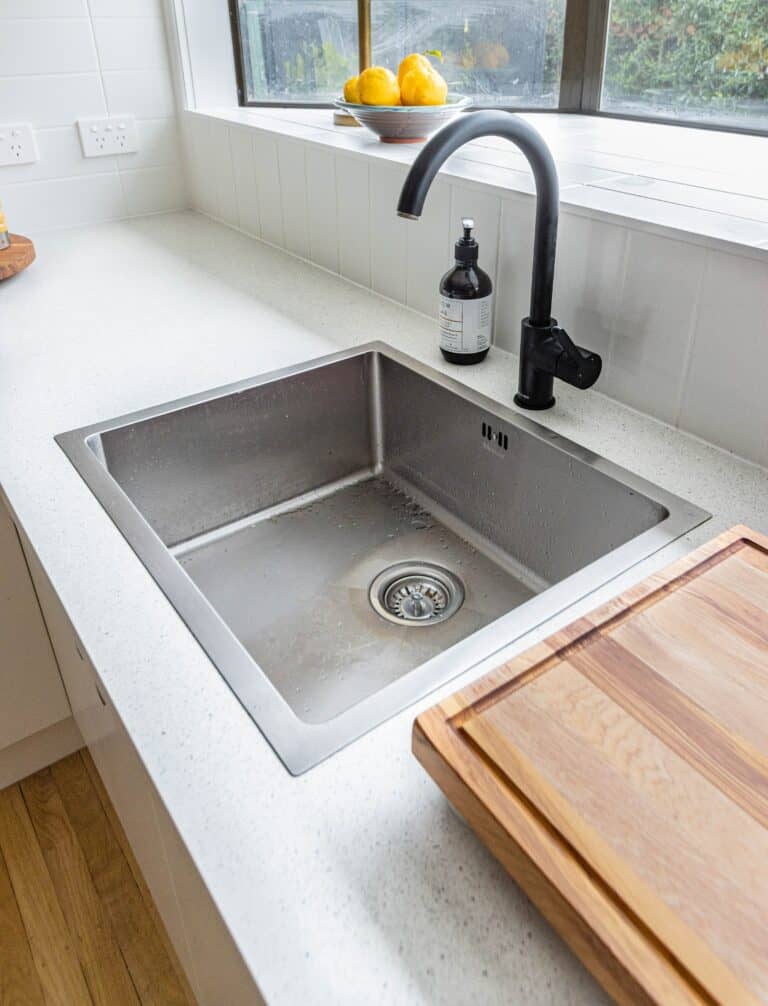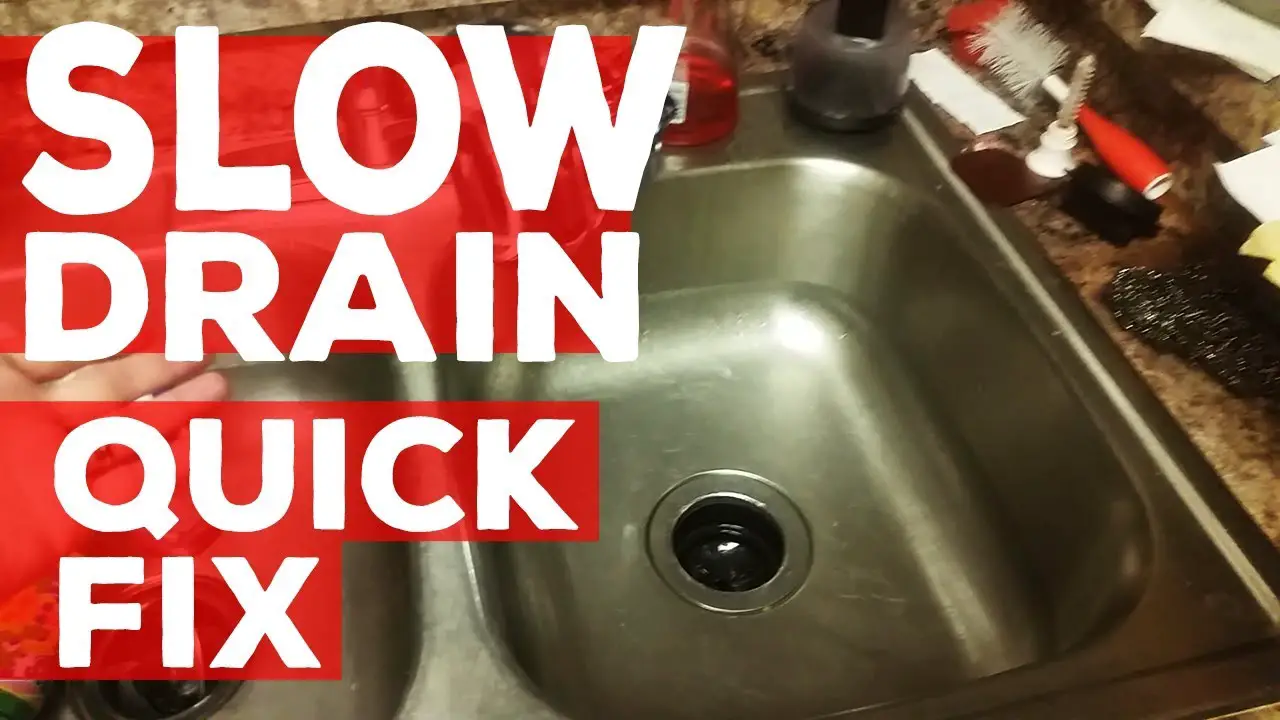If your kitchen sink is draining slowly but not clogged, it may be due to a buildup of grease and food particles in the pipes. This can constrict the flow of water and cause the drainage to slow down.
To address this issue, you can try using a mixture of baking soda and vinegar to break down the buildup. Additionally, pouring hot water down the drain can help to flush out any remaining debris. If these methods do not improve the drainage, you may need to inspect the P-trap for any blockages or consider seeking professional plumbing assistance for a thorough inspection and resolution of the issue.
Addressing this problem promptly can help prevent more serious plumbing issues in the future.
Slow Draining Kitchen Sink Explained
When experiencing a slow draining kitchen sink, it’s essential to dispel common misconceptions about sink blockages. While it may seem like a clog is the culprit, symptoms indicating a non-clogged slow drain, such as gurgling noises or water backup, can actually signal a different issue. Understanding the true problem is crucial for effective troubleshooting. In some cases, a partial clog, grease buildup, or faulty installation may be the root cause. By focusing on addressing the real issue, homeowners can avoid unnecessary remedies and find a solution that resolves the problem at its source.
Potential Causes
When dealing with a slow-draining kitchen sink, it’s essential to consider the potential causes. Partial blockages within the plumbing can restrict the flow of water and lead to sluggish drainage. Venting issues affecting sink drainage can also contribute to the problem, causing water to empty slowly. Additionally, the accumulation of grease and soap within the pipes can impact draining speed, requiring corrective measures for effective drainage. Moreover, problems arising from the sink’s installation or design can also be a source of the issue, demanding attention to ensure optimal drainage performance.
Troubleshooting Techniques
When your kitchen sink is draining slowly, you may not immediately assume that it is due to a clog. Conduct a thorough inspection of the sink drain to identify the underlying issue. Begin by assessing the speed at which the water drains from the sink. If it is sluggish, proceed to examine the garbage disposal for any obstructions that could be impeding the flow. Additionally, address any potential issues within the P-trap and check the air vent to ensure that it is functioning properly. By systematically troubleshooting these components, you can pinpoint the cause of the slow drainage and take the necessary steps to resolve the issue, improving the efficiency of your kitchen sink.
Diy Solutions
If your kitchen sink is draining slowly, it may not necessarily be due to a clog. Home remedies such as using natural cleaners or a chemical solution can effectively improve drainage. You can also follow a step-by-step guide to clean the P-trap, which often causes slow drainage. Learning when and how to safely snake a drain can also help to address the issue without the need for professional help.
Maintaining Optimal Drainage
Maintaining optimal drainage in your kitchen sink is essential for preventing a slow draining issue. Regularly cleaning and avoiding food debris can help prevent clogs and slow drainage. Additionally, using a sink strainer can assist in catching large particles, thus preventing them from entering the drain. Periodic checks for leaks and corrosion in the pipes can ensure optimal drainage. Furthermore, using eco-friendly drain cleaners can help in effectively removing buildup and preventing slow drainage. By incorporating these daily practices and products into your sink maintenance routine, you can help prevent slow draining issues and maintain an efficiently working kitchen sink.
Professional Intervention
If you notice gurgling sounds coming from your drain and frequent backups, it may be time to seek professional help. A plumber can conduct a thorough assessment to pinpoint the cause of the slow drainage. During the assessment, the plumber will inspect the pipes and use specialized tools to identify any blockages or issues within the plumbing system. Once the problem has been diagnosed, the plumber can provide cost-effective remedies to resolve the slow draining. These solutions may include hydro-jetting, snaking, or pipe repair to restore proper drainage to your kitchen sink.

Credit: mytrustedexpert.com
Frequently Asked Questions For Slow Draining Kitchen Sink Not Clogged
Why Is My Kitchen Sink Draining Slowly?
If your kitchen sink is draining slowly, it could be due to a buildup of grease, food particles, or other debris in the pipes. Over time, these can restrict the flow of water and cause drainage issues. Regular cleaning and maintenance can help prevent this problem.
Can A Slow Draining Sink Cause Plumbing Problems?
Yes, a slow draining sink can lead to plumbing issues such as clogs, water backups, and pipe damage. If left untreated, the buildup in the pipes can worsen, causing more severe blockages and potential damage to the plumbing system. Prompt attention to slow draining sinks can prevent these problems.
How Can I Fix A Slow Draining Kitchen Sink Without Using Chemicals?
One method is to use a plunger to try and dislodge the blockage. You can also remove the sink trap and clean it out. Another option is to use a combination of baking soda and vinegar, followed by hot water, to help break down and flush out the buildup.
Regular maintenance is essential to prevent future issues.
Conclusion
Inadequate drainage in the kitchen sink is a common issue. By implementing simple DIY strategies, you can improve the situation without relying on harsh chemicals or costly repairs. Regular maintenance and awareness of potential causes can prevent slow drains, ensuring a smoothly functioning sink.
With these tips, you can maintain a clear and efficient kitchen plumbing system.

